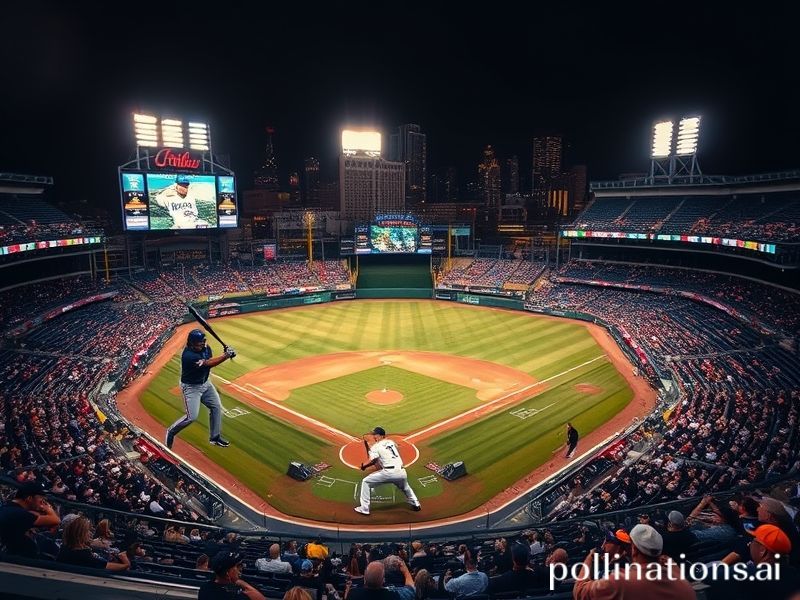Royals vs Guardians: Baseball’s Crown-Jewel Proxy War for Global Soft Power
Royals vs Guardians: How a Pedigreed Pastime Became a Global Power Struggle
The phrase “Royals vs Guardians” sounds like the elevator pitch for a Netflix fantasy series—complete with brooding heirs, moody castles, and a CGI dragon voiced by a disgraced Oscar winner. In reality, the drama is unfolding on baseball diamonds from Kansas City to Cleveland, across time zones where most viewers can’t tell a bunt from a bundt cake. Yet the international stakes have never been higher, because this is no longer merely a mid-season American League face-off. It is a proxy war for who gets to guard the empire’s dwindling soft power, and who gets to keep the crown—metaphorical, of course, since actual monarchies are busy rebranding as lifestyle influencers.
Start with the Royals, the team named after inherited privilege and a souvenir shop in the shadow of Windsor Castle. Their fan base stretches from suburban Missouri to the Gulf sheikhdoms, where satellite dishes beam in 4 a.m. games to princes nostalgic for the boarding schools of Surrey. The franchise’s royal motif is catnip for global audiences raised on Disneyfied sovereignty: you can almost hear the merchandising spreadsheets screaming “limited-edition tiaras for the Japanese market.” Meanwhile, the Guardians—formerly the Indians, rebranded after someone finally read the room—have positioned themselves as sentinels of a more egalitarian, if equally corporate, future. Their logo is an art-deco winged G, which looks suspiciously like the badge on a private security firm hired to protect oligarchs’ super-yachts. Irony is not dead; it’s simply on retainer.
On the field, the clash is statistically modest: two small-market teams trying to slug their way out of irrelevance. But in the grand bazaar of geopolitics, every pop fly is a potential propaganda coup. Chinese streaming platforms push the series as evidence that America still produces obedient workers who run clockwise for eight-dollar beer. European Union trade negotiators watch closely, calculating whether the ballpark’s overpriced nacho helmets violate single-market cheese standards. And somewhere in the Kremlin, an underpaid analyst adds “Kauffman Stadium concessions revenue” to a spreadsheet titled “Indicators of Western Decadence,” right between “TikTok sea-shanty revival” and “CBD pet shampoo.”
The broader significance crystallizes when you realize both clubs are owned by hedge funds that also trade carbon credits and defense stocks. One inning you’re watching a rookie from the Dominican chase a curveball; the next, that same kid’s signing bonus is being securitized into a derivative sold to Nordic pension funds under the label “Emerging Market Sports Alpha.” The Royals’ star shortstop might be two weeks away from a diplomatic passport if Qatari soft-power consultants decide his swing tests well with focus groups in Doha. The Guardians’ closer, whose slider breaks sharper than Brexit negotiations, could find himself on a public-diplomacy tour of Sub-Saharan Africa, teaching the knuckle-curve as a metaphor for resilience against global supply-chain shocks. Soft power, it turns out, has a really good ERA.
And then there are the fans—the real global variable. In Seoul’s Gangnam district, office drones stream games on mute during 14-hour shifts, projecting their own workplace hierarchies onto the scoreboard. In Lagos minibuses, conductors argue over whether the Royals’ bullpen collapse is analogous to the national grid. Meanwhile, Canadian data scientists crunch the biomechanics of each pitch, feeding the results to sportsbooks from Manila to Malta, because nothing says international cooperation like synchronized gambling addiction.
By the ninth inning, the final score feels almost quaint; what matters is the data exhaust, the merch sales, the memes. Royals or Guardians, crown or shield, the victors will celebrate with the same plastic trophy handed out to Little-League champs in suburban Tokyo—a reminder that empires end not with a bang, but with a corporate sponsorship deal and a bobblehead giveaway.
So cue the fireworks, cue the military-grade flyover, cue the inevitable TikTok of a British royal awkwardly gripping a foam finger. Somewhere, an algorithm is already writing next season’s script. Spoiler alert: the dragon still dies, but only after negotiating streaming rights.







